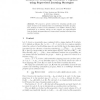Free Online Productivity Tools
i2Speak
i2Symbol
i2OCR
iTex2Img
iWeb2Print
iWeb2Shot
i2Type
iPdf2Split
iPdf2Merge
i2Bopomofo
i2Arabic
i2Style
i2Image
i2PDF
iLatex2Rtf
Sci2ools
SAGA
2009
Springer
2009
Springer
Bounds for Multistage Stochastic Programs Using Supervised Learning Strategies
We propose a generic method for obtaining quickly good upper bounds on the minimal value of a multistage stochastic program. The method is based on the simulation of a feasible decision policy, synthesized by a strategy relying on any scenario tree approximation from stochastic programming and on supervised learning techniques from machine learning. 1 Context Let Ω denote a measurable space equipped with a sigma algebra B of subsets of Ω, defined as follows. For t = 0, 1, . . . , T − 1, we let ξt be a random variable valued in a subset of an Euclidian space Ξt, and let Bt denote the sigma algebra generated by the collection of random variables ξ[0: t−1] def = {ξ0, . . . , ξt−1}, with B0 = {∅, Ω} corresponding to the trivial sigma algebra. Then we set BT −1 = B. Note that B0 ⊂ B1 ⊂ · · · ⊂ BT −1 form a filtration; without loss of generality, we can assume that the inclusions are proper — that is, ξt cannot be reduced to a function of ξ[0: t−1]. Le...
| Added | 27 May 2010 |
| Updated | 27 May 2010 |
| Type | Conference |
| Year | 2009 |
| Where | SAGA |
| Authors | Boris Defourny, Damien Ernst, Louis Wehenkel |
Comments (0)

